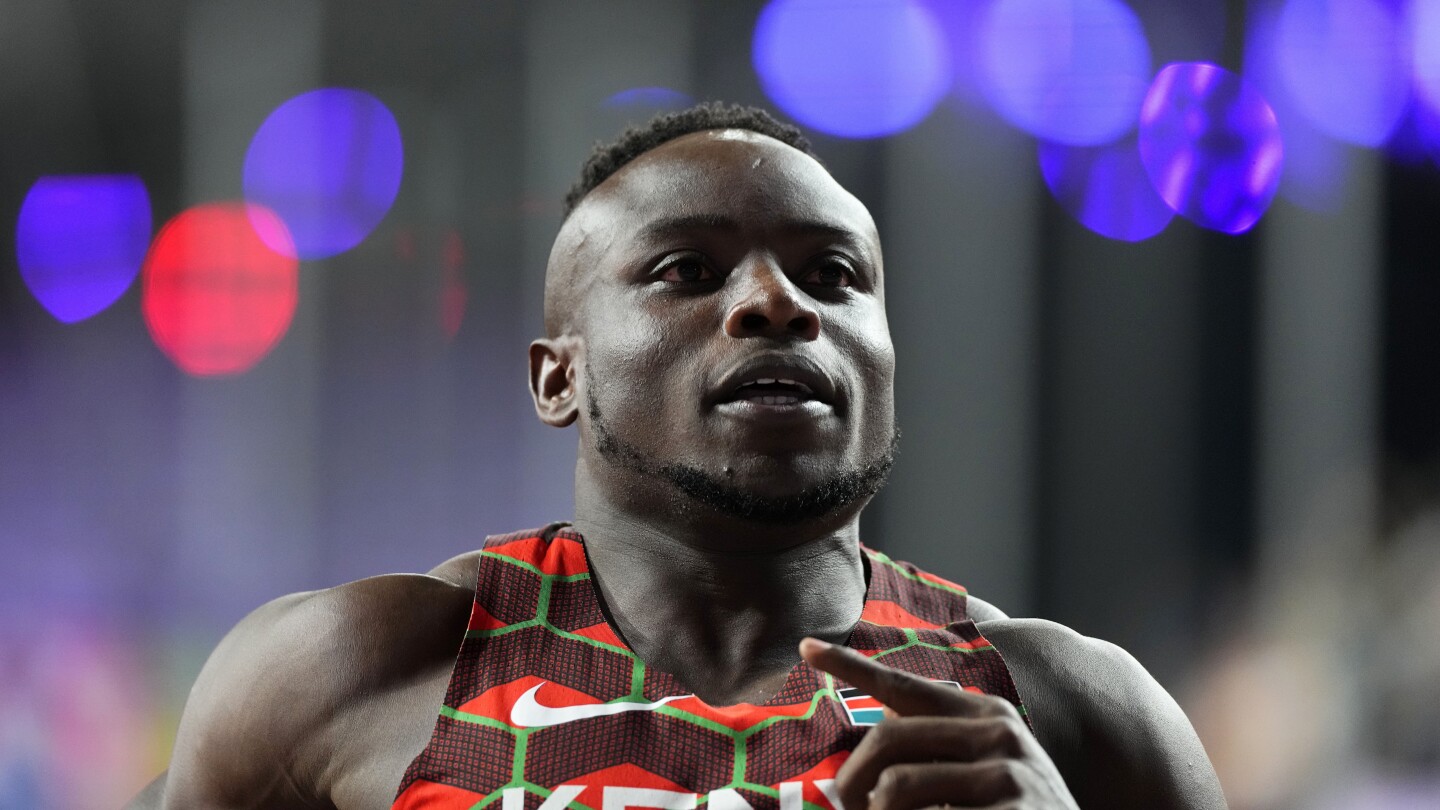Ferdinand Omanyala’s status as Africa’s fastest man has many people believing Kenya’s push for Olympic gold medals isn’t entirely a long-distance objective.
The Commonwealth Games 100-meter champion doesn’t want to get ahead of himself, though, despite posting the second-fastest time this season of 9.79 seconds to qualify for Paris at the national Olympic trials.
“I won’t say I am thinking of the final,” Omanyala said. “Of course it’s at the back of my mind but the Olympics has heats, semis and the final so you can’t start thinking about the final when you are not there yet — so many things happen.”
Among the sprinters from African countries who have qualified for the 100 in Paris, including Botswana’s world championship silver medalist Letsile Tebogo and South Africa’s Akani Simbine, Omanyala has run the fastest times.
His comeback from a doping ban imposed in 2017 to becoming the 9th-fastest man of all time has inspired Kenyans and has drawn more crowds to stadiums during national competitions.
His 9.77 personal best, a continental record set in September 2021 in Nairobi, united a nation in celebration and some Kenyans honored him by naming new born babies after him.
His name and image have been emblazoned on some of the graffiti-covered private minibuses, known as matatus, that serve as the main source of public transportation.
So there’s a lot of expectations for Omanyala to be the first man from an African nation to win the Olympic 100-meter title.
The ex-rugby winger has had to reject assertions from critics that he loses his nerve in major global events, owing to his failure to reach the final at the Tokyo Olympics or the podium at last year’s world titles.
Omanyala had been touted by the American sprint legend Michael Johnson as a potential 100-meter champion at last year’s World Championships in Budapest, Hungary but placed seventh in the final. He attributed that to inexperience in dealing with flight fatigue.
Paris Olympics
- Simone Biles, fresh off leading the U.S. women’s gymnastics team back to the gold medal in team competition, returns to the mat.
- Take a look at everything else to watch on Day 7.
- See AP’s top photos from the 2024 Paris Olympics.
- Olympic schedule of events and follow all of AP’s coverage of the Summer Games.
- Which countries are in the lead? Take a look at the Olympic medal tracker.
- Want more? Sign up for our daily Postcards from Paris newsletter.
He has visibly lost size from his bulging musculature and attributes the changes to his strategy for this Olympics, where he’s aiming to maintain strength but carry a lighter frame in a bid to run faster and also recover quicker between races.
Omanyala is an example of Kenya’s ambitions for success beyond distance running and among the most prominent athletes affected by a doping crisis in a country where more than 200 athletes have been banned over the last seven years.
Kenya has achieved great success in modern distance running, but a wave of positive drug tests has made it one of the sport’s latest doping pariahs.
Omanyala received a 14-month suspension after testing positive for the prohibited substance betamethasone, a ban which could have cost him any chance of representing Kenya again.
He maintains his case was a result of pain medication he received for a back injury and wasn’t intentional doping.
“There are those who do it intentionally,” Omanyala concedes of the doping problem, but he adds: “There are those who eat (contaminated) meat and they end up testing positive; there are those who walk into chemists or medication places and they are given medication that have steroids in them — (those) people you cannot put in the same bracket.
“Don’t judge when you first hear an athlete has tested positive for banned substances, try to hear the story.”
Athletes who are using performance enhancement drugs intentionally are making it difficult for the rest, he said, because any time a Kenyan athlete is running well there will be suspicion that they maybe on performance enhancers.
Barnaba Korir, an Athletics Kenya official, says authorities have ramped up education programs for young athletes across the country to help them understand the implications of doping and avoid it.
Poverty and unemployment are the main factors driving some athletes to use banned substances because they’re trying to pull themselves and their families out of penury, Korir says, and will do so at all costs.
The concentration of talent also means that while some countries can focus testing on a small elite groups, Kenya has hundreds of distance runners capable of competing internationally from middle distance to the marathon.
The scope of events is broadening.
Kenyan sports authorities are hopeful that the inclusion of Omanyala and Alexandra Ndolo — Kenya’s first representative in Olympic fencing — will increase the medal hauls that have traditionally depended on middle- and long-distance runners.
“This is one of the best teams we have ever assembled for the Olympics” Korir said of a Kenya contingent containing 42 track and field athletes, two swimmers, one fencer, one judoka, as well as volleyball and rugby sevens teams.
With a total medal haul of 113 medals, including 35 gold, since first participating at the Summer Games in 1956, Kenya is the continent’s most successful at Olympics.
Omanyala says he wants to leave a legacy in which Kenya produces a world-class sprinter more frequently.
“For the long distance races, we have an industry in this country,” he said, “so that is what I want to do with sprints.”
___
AP Summer Olympics: https://apnews.com/hub/2024-paris-olympic-games

